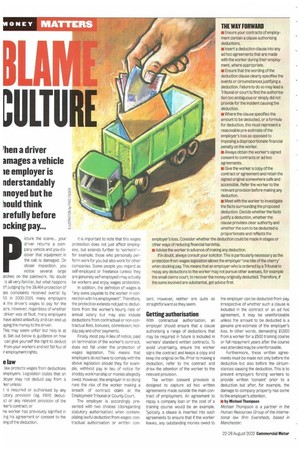'hen a driver amages a vehicle le employer is nderstandably nnoyed but he nould think arefully before °thing pay...
Page 26

If you've noticed an error in this article please click here to report it so we can fix it.
picture the scene... your driver returns a company vehicle and you discover that equipment in the cab is damaged. On closer inspection, you notice several large etches on the paintwork. No doubt is all very famlliar, but what happens 0 Judging by the 39,464 protection of es complaints received overall by
in 2000-2001, many employers ik the driver's wages to pay for the airs. However, regardless of whether driver was at fault, many employers have acted unlawfully and can end up eying the money to the driver.
This may seem unfair but help is at d. Set out below is guidance on how can give yourself the right to deduct from your workers and not fall foul of r employment rights,
e law
law protects wages from deductions 3mployers. Legislation states that an ployer may not deduct pay from a • ker unless: t is required or authorised by any :utory provision (eg. PAYE deducs) or any relevant provision of the 'kers contract; or he worker has previously signified in :irg his agreement or consent to the cing of the deduction,
It is important to note that this wages protection does not just affect employees, but extends further to 'workers,— for example, those who personally perform work for you but also work for other companies. Some people you regard as self-employed or freelance (unless they are genuinely self-employed) may actually be workers and enjoy wages protection.
In addition, the definition of wages is "any sums payable to the worker in connection with his employment". Therefore, the protection extends not just to deductions from the worker's hourly rate or annual salary but may also include deductions from contractual or non-contractual fees, bonuses, commission, holiday pay and other payments.
Finally, most pay in lieu of notice, paid on termination of the worker's contract, does not fall under the protection of wages legislation. This means that employers do not have to comply with the above legislation should they, for example, withhold pay in lieu of notice for shoddy workmanship or monies allegedly owed. However, the employer in so doing runs the risk of the worker making a breach of contract claim at the Employment Tribunal or County Court.
The employer is accordingly presented with two choices (disregarding statutory authorisation) when contemplating lawful deduction from wages: contractual authorisation or written con
sent. However, neither are quite as straightforward as they seem.
Getting authorisation
With contractual authorisation, an employer should ensure that a clause authorising a range of deductions that may be required in future is included in workers' standard written contracts. To avoid uncertainty, ensure the worker signs the contract and keeps a copy and keep the original on file. Prior to making a deduction, refer to the contract and draw the attention of the worker to the relevant provision.
The written consent provision is designed to capture ad hoc written agreements made outside the main contract of employment. An agreement to repay a company loan or the cost of a training course would be an example. Typically, a clause is inserted into such agreements to ensure that if the worker leaves, any outstanding monies owed to the employer can be deducted from pay. Irrespective of whether such a clause is included in the contract or an ad hoc agreement, it may be unenforceable unless the amount to be deducted is a genuine pre-estimate of the employer's loss. In other words, demanding £1,000 from a worker for a £600 training course or full repayment years after the course was attended may be unenforceable.
Furthermore, these written agreements must be made not only before the deduction but also before the circumstances causing the deduction. This is to prevent employers forcing workers to provide written 'consent' prior to a deduction but after, for example, the damage to company property has come to the employer's attention.
• by Michael Thompson Michael Thompson is a partner in the Human Resources Group of the international law firm Eversheds, based in Manchester.
















































































































































